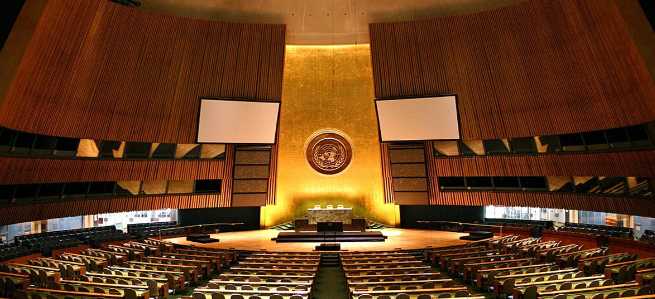UNGA 79th Session Commences (GS Paper 2, International Organizations)

Context
- The 79th session of the United Nations General Assembly (UNGA) began on September 10, 2024, marking another significant chapter in the UN's ongoing mission to address global challenges.
- This session gathers representatives from all 193 member states to engage in critical discussions aimed at shaping international policy and cooperation.
Purpose and Role of the UNGA
The UNGA is a central platform where countries come together to deliberate on key issues affecting global peace and security. The assembly provides a venue for member states to:
- Promote International Peace and Security: The UNGA discusses conflicts and tensions affecting various regions, seeking collective strategies to prevent or resolve disputes.
- Advance Sustainable Development: It focuses on initiatives to support economic growth, environmental sustainability, and social progress.
- Support Human Rights: The assembly addresses human rights violations and advocates for international standards to protect individuals' freedoms and dignity.
- Foster Disarmament: It engages in discussions on reducing or eliminating weapons of mass destruction and conventional arms.
These discussions are essential for coordinating global efforts and fostering international cooperation. While the resolutions and recommendations made in the UNGA are not legally binding, they carry significant moral and political weight, influencing international norms and practices.
Equality Among Member States
- One of the foundational principles of the UNGA is that each member state, regardless of its size, economic power, or military strength, has an equal vote.
- This egalitarian approach ensures that all countries have an opportunity to contribute to global discussions and decisions, reflecting the UN’s commitment to fairness and democratic values.
- Although UNGA resolutions do not have the legal force of Security Council decisions, they play a crucial role in shaping international discourse and setting agendas for global action.
- The principle of equality reinforces the idea that every nation, no matter how small or large, has a stake in global governance.
Leadership of the 79th Session
- The 79th session is led by Philemon Yang, the former Prime Minister of Cameroon.
- As President of this session, Yang is tasked with guiding discussions and ensuring that the session’s objectives are met.
- His leadership emphasizes the importance of collective action and cooperation among member states to address global challenges effectively.
- Yang has underscored the need for countries to collaborate on sustainable development and uphold human dignity, reflecting the session's overarching theme.
General Debate: Key Dates and Focus
- The General Debate, a highlight of the UNGA session, is scheduled from September 24 to September 30, 2024.
- During this period, representatives from all member states will deliver speeches outlining their nations' positions on various issues, contributing to a broad, inclusive dialogue on global priorities.
- The debate is expected to cover a range of topics, including climate change, conflict resolution, economic inequality, and human rights.
- The diverse perspectives shared during the debate will help shape the UNGA’s agenda and inform future international policies.
Theme of the 79th Session
- This year’s theme, “Leaving No One Behind: Acting Together for the Advancement of Peace, Sustainable Development, and Human Dignity for Present and Future Generations,” reflects a commitment to inclusivity and collective action.
- The theme underscores the need for global cooperation to ensure that all individuals, particularly the most vulnerable, benefit from progress and development.
- It highlights the importance of addressing disparities and promoting equitable opportunities for all, while also focusing on long-term goals for future generations.
- This theme guides the discussions and priorities for the session, aiming to drive meaningful progress on key global issues.
Historical Context of the UNGA
- The UNGA meets annually in September, bringing together representatives from all member states.
- Established in 1945 with the formation of the United Nations, the UNGA is unique in that it is the only UN body where every country has an equal vote.
- While its resolutions are not legally binding, they are influential in shaping international norms and policies.
- The UNGA also plays a critical role in electing non-permanent members to the Security Council and approving the UN’s budget.
- One of its notable contributions to international diplomacy was the adoption of the “Uniting for Peace” resolution in 1950, which allows the UNGA to address issues of international peace and security if the Security Council is unable to act.
Overall, the UNGA serves as a crucial forum for international dialogue and cooperation, reflecting the collective will and concerns of the global community.


